
Catalog excerpts
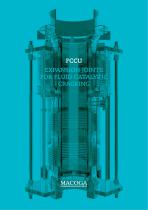
FCCU EXPANSION JOINTS FOR FLUID CATALYTIC CRACKING ENGINEERED EXPANSION JOINTS
Open the catalog to page 1
Expansion Joints for Fluid Catalytic Cracking - FCCU INTRODUCTION TO FCCU EXPANSION JOINTS TYPES OF FCCU EXPANSION JOINTS Hot Wall Cold wall Unlined THE BELLOWS Monitored bellows Packed bellows Self-equalizing rings MATERIALS SELECTION Bellows Pipe body REFRACTORY MATERIALS AND INSTALLATION EXTERNAL HARDWARE QUALITY ASSURANCE & TESTING FCCU EXPANSION JOINT ON-SITE SERVICES Assembly of the Expansion Joints Assembly Supervision FCCU Expansion Joints On-Site Inspection Service Why FCCU Expansion Joints On-Site Inspection? Type of failure - Causes / Things to do - Risk level What is Site...
Open the catalog to page 3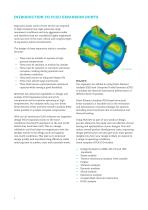
INTRODUCTION TO FCCU EXPANSION JOINTS Expansion joints used in FCCU service are exposed to high temperatures, high pressures, large movement conditions and very aggressive media and therefore they are considered highly engineered units and one of the most critical and complex types of expansion joints manufactured. The design of these expansion joints is complex because: — They must be suitable to operate at high process temperatures — They must be resistant to erosion by catalyst — They must be resistant to corrosion and stress corrosion cracking during operation and shutdown conditions —...
Open the catalog to page 4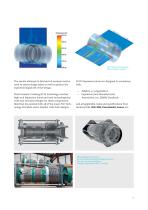
FEA Thermo-mechanical / Heat transfer analysis. The results obtained in this kind of analysis may be used to assess design safety as well as predict the expected fatigue life of the design. Fluid Catalytic Cracking (FCC) technology involves high tech Expansion Joints and each technology provider has exclusive designs for these components. MACOGA has worked with all of the major FCC Technology Providers and is familiar with their designs. FCCU Expansion joints are designed in accordance with: — ASME B 31.3 Appendix X — Expansion Joint Manufacturers Association, Inc. (EJMA) Standards and all...
Open the catalog to page 5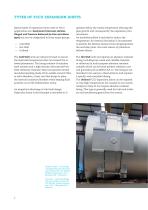
TYPES OF FCCU EXPANSION JOINTS Typical types of expansion joints used in FCCU applications are: Restrained Universal, Gimbal, Hinged and Pressure Balanced (in-line and elbow type) and can be categorized in three major groups: — Cold Wall — Hot Wall — Unlined The Cold Wall units are refractory lined to ensure the shell wall temperature does not exceed the allowed parameters. The lining consists of stainless steel anchors and a high-density vibrocast/self-levelled refractory material. They incorporate internal insulation/packing made of bio-soluble ceramic fibre or silica blankets, a liner...
Open the catalog to page 6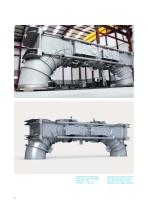
Floating Plate Technology Universal – Hot wall design – FLUE GAS LINE DN1300 – L: 7300 mm Two ply monitored Inconel 625 LCF bellows. Design temperature: 788 °C (medium) 538 °C (bellows).Total weight: 266
Open the catalog to page 8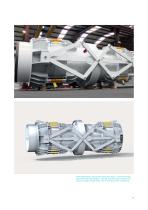
FCCU Regenerator Stand Pipe Expansion Joint – Cold wall design Universal with Pantographs. Two ply monitored Inconel 625 LCF bellows. Design temperature: 760 °C (medium) 538 °C (bellows)
Open the catalog to page 9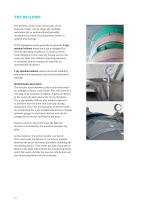
THE BELLOWS The bellows, as the most critical part of the Expansion Joint, can be single ply, multiply, redundant ply or reinforced and generally incorporate an early warning system (active or passive monitoring). FCCU expansion joints generally incorporate 2-ply testable bellows where each ply is designed for the full operating conditions. If a hole or stress crack develops in the inner ply during service, the outer ply takes over without exposing operators to increased risk or creating the need for an unscheduled shutdown. 2 ply testable bellows system improves reliability and makes the...
Open the catalog to page 10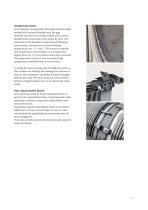
PACKED BELLOWS FCCU bellows are generally internally and externally packed with ceramic blankets and the gap between the sleeve and body is filled with a metal braided hose connected to the sleeve by pins. The thickness of the blankets is determined following heat transfer calculations to assure bellows temperature 200 < T < 500°C. The reason to specify the temperature of the bellows at a temperature higher than 200 °C, is to prevent dew point corrosion. The upper limit of 500 °C was to prevent high temperature embrittlement of lnconel 625. To avoid the dust entering into the bellows cavity...
Open the catalog to page 11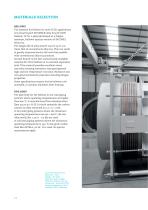
MATERIALS SELECTION BELLOWS The material for bellows for most FCCU applications is Inconel 625LCF. INCONEL® alloy 625LCF (UNS N06626 / W. Nr. 2.4856) developed as a fatigueresistant, bellows-quality version of INCONEL alloy 625. The fatigue life of alloy 625LCF can be up to 100 times that of conventional alloy 625. This can result in greatly improved service life over that possible with conventional alloy 625 products. Inconel 625LCF is the best commercially available material for FCCU bellows in an external expansion joint. This material provides excellent stress corrosion cracking...
Open the catalog to page 14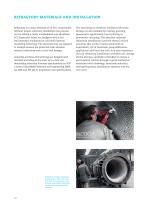
REFRACTORY MATERIALS AND INSTALLATION Refractory is a major element of all FCC components. Without proper refractory installation the process unit is risking a costly unscheduled unit shutdown. FCC Expansion Joints are designed with a hot wall (external insulation) or cold wall (internal insulating refractory). The internals that are exposed to catalyst erosion are protected with abrasion resistant refractory even in hot wall designs. Generally, all these critical linings are designed and installed according to the most up-to-date and demanding refractory licensors specifications as UOP...
Open the catalog to page 16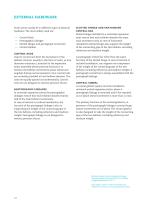
EXTERNAL HARDWARE FCCU joints usually fit in different types of external hardware. The most widely used are: — — — — Control Rods Pantographic linkages Slotted Hinges and pantograph central bar Central Gimbal CONTROL RODS Used to control and limit the movement of the bellows. Devices, usually in the form of rods ( 30 mm diameter minimum ), attached to the expansion joints assembly whose primary function is to restrain the bellows movements (axial, lateral and angular) during normal operation. Four control rods are normally provided at each bellows element. The rods are equally spaced...
Open the catalog to page 18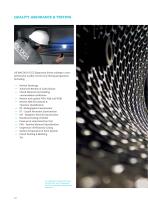
QUALITY ASSURANCE & TESTING All MACOGA FCCU Expansion Joints undergo a comprehensive quality control and testing programme including: — Review Drawings — Advanced Review of Calculations — Check Material and welding consumables certificates — Review and update WPS, PQR and WQR — Review NDE Procedures & Operator Qualification — RT- Radiographic Examination — PT - Liquid Penetrant Examination — MT - Magnetic Particle Examination — Hardness Testing of Welds — Pressure & Leak Detection Test — PMI - Positive Material Identification — Inspection of Refractory Lining — Surface Preparation & Paint...
Open the catalog to page 20All Macoga catalogs and technical brochures
-
RUBBEREXPANSION JOINTS
32 Pages
-
METALEXPANSIONJOINTS
32 Pages



